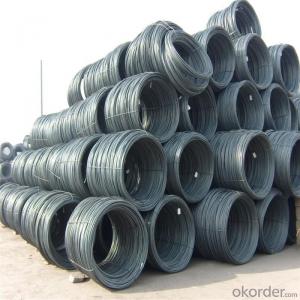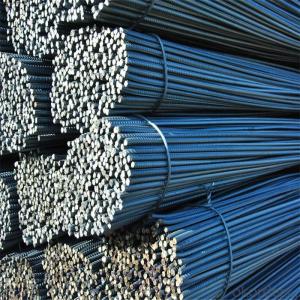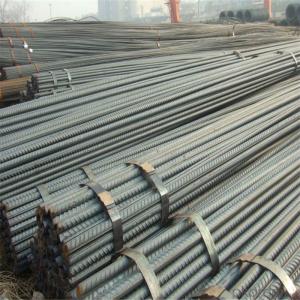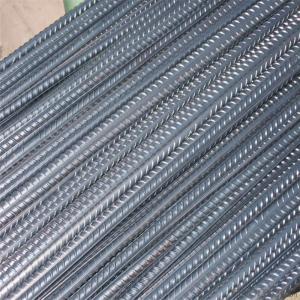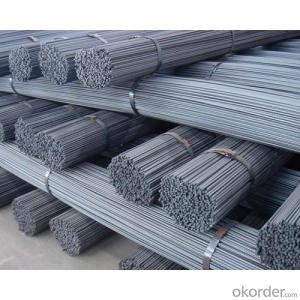Reinforcing Twisted Steel Bars
- Loading Port:
- Tianjin
- Payment Terms:
- TT OR LC
- Min Order Qty:
- 140 m.t.
- Supply Capability:
- 500000 m.t./month
OKorder Service Pledge
OKorder Financial Service
You Might Also Like
Item specifice
Reinforcing Twisted Steel Bars
Description of Reinforcing Twisted Steel Bars
1, Diameter: 5.5mm-10mm Reinforcing Twisted Steel Bars
10m- 40mm Reinforcing Twisted Steel Bars
2, Length: 6m, 9m, 12m or customized
3, Standard: GB, ASTM, AISI, SAE, DIN, JIS, EN
OEM technology - send detailed technical parameters for accurate quotation.
2, Produce Process: smelt iron - EAF smelt billet - ESR smelt billet -
hot rolled or forged to get the steel round bar and plate
3, Heat Treatment: annealing, normalizing, tempering, quenching
4, Surface Treatment: Black
5, Quality Assurance: We accept third party inspection for all orders.
You can ask testing organizations such as SGS, BV, etc. to test our products before shipping.
Chemical Composition of Reinforcing Twisted Steel Bars
Grade | Technical data of the original chemical composition(%) | |||||
Reinforcing steel bar HRB335 | C | Mn | Si | S | P | B |
≤0.25 | ≤1.60 | ≤0.80 | ≤0.045 | ≤0.045 | >0.0008 | |
Physics Capability | ||||||
Yield Strength(N/cm2) | Tensile Strength(N/cm2) | Elongation(%) | ||||
≥ 335 | ≥490 | ≥16 | ||||
Reinforcing steel bar HRB400 | C | Mn | Si | S | P | B |
≤0.25 | ≤0.16 | ≤0.80 | ≤0.045 | ≤0.045 | 0.04-0.12 | |
Physics Capability | ||||||
Yield Strength(N/cm2) | Tensile Strength(N/cm2) | Elongation(%) | ||||
≥ 400 | ≥ 570 | ≥ 14 | ||||
Products Show of Reinforcing Twisted Steel Bars
Company Information
CNBM International Corporation is the most important trading platform of CNBM group.
Whith its advantages, CNBM International are mainly concentrate on Cement, Glass, Iron and Steel, Ceramics industries and devotes herself for supplying high qulity series of refractories as well as technical consultancies and logistics solutions.


F A Q
1, Your advantages?
professional products inquiry, products knowledge train (for agents), smooth goods delivery, excellent customer solution proposale
2, Test & Certificate?
SGS test is available, customer inspection before shipping is welcome, third party inspection is no problem
3, Factory or Trading Company?
CNBM is a trading company but we have so many protocol factories and CNBM works as a trading department of these factories. Also CNBM is the holding company of many factories.
4, Payment Terms?
30% TT as deposit and 70% before delivery.
Irrevocable L/C at sight.
5, Trading Terms?
EXW, FOB, CIF, FFR, CNF
6, After-sale Service?
CNBM provides the services and support you need for every step of our cooperation. We're the business partner you can trust.
For any problem, please kindly contact us at any your convenient time.
We'll reply you in our first priority within 24 hours.
- Q:What is the significance of phosphorus in special steel?
- Phosphorus plays a vital role in the production of special steel due to its numerous advantageous properties. To begin with, it acts as a deoxidizer during the steel manufacturing process, thereby eliminating impurities like oxygen. This results in an overall improvement in the quality and purity of the steel, making it more resistant to corrosion and enhancing its mechanical properties. Additionally, phosphorus has the ability to enhance the strength and hardness of the steel, making it ideal for applications that demand durability and resistance to wear. It also aids in improving the steel's machinability, facilitating easier shaping and processing. Moreover, phosphorus contributes to the steel's capacity to retain its strength even at high temperatures, making it suitable for use in environments like power plants or aerospace industries. However, it is crucial to control the concentration of phosphorus within certain limits as excessive levels can have detrimental effects. A high phosphorus content can lead to brittleness, reduced toughness, and decreased weldability of the steel. Therefore, it is necessary to carefully consider and balance the beneficial effects of phosphorus with its potential drawbacks. In conclusion, the significance of phosphorus in special steel lies in its ability to enhance the quality, purity, strength, hardness, machinability, and high-temperature performance of the steel. By controlling the phosphorus content within appropriate limits, manufacturers can produce special steel with improved properties that meet the specific requirements of various industrial applications.
- Q:Can special steel be used in high-pressure applications?
- Yes, special steel can be used in high-pressure applications. Special steel alloys, such as stainless steel or high-strength low-alloy steel, possess excellent mechanical properties and resistance to corrosion, making them suitable for withstanding high-pressure environments. These steels can maintain their structural integrity and perform reliably under extreme pressure conditions, making them a preferred choice in various industries, including oil and gas, aerospace, and chemical processing.
- Q:How does special steel contribute to the dimensional stability of products?
- Special steel contributes to the dimensional stability of products through its unique properties and characteristics. One of the key factors is its high level of hardness, which allows it to resist deformation or changes in shape and size under varying temperature and load conditions. This hardness ensures that the product maintains its intended dimensions and shape, even when subjected to external forces or thermal fluctuations. Moreover, special steel often possesses excellent thermal conductivity, enabling it to efficiently distribute and dissipate heat. This property helps prevent localized heating or cooling, which can cause dimensional changes in materials. By maintaining consistent temperatures across the product, special steel minimizes the risk of warping, expansion, or contraction, thereby ensuring dimensional stability. Another aspect that contributes to dimensional stability is the low coefficient of thermal expansion of special steel. This coefficient measures the amount of expansion or contraction a material undergoes in response to temperature changes. Special steel's low coefficient means it experiences minimal dimensional changes when exposed to temperature variations. This characteristic is particularly crucial in applications where precise tolerances and tight dimensional control are required, such as in aerospace or automotive industries. Furthermore, special steel often possesses enhanced corrosion resistance, which helps prevent rusting or degradation of the material over time. Corrosion can lead to changes in the shape and dimensions of products, compromising their dimensional stability. By using special steel, manufacturers can ensure that their products maintain their original dimensions and structural integrity, even in harsh or corrosive environments. Overall, the unique properties of special steel, such as high hardness, excellent thermal conductivity, low coefficient of thermal expansion, and corrosion resistance, all contribute to the dimensional stability of products. By incorporating special steel into the manufacturing process, companies can produce high-quality products that maintain their precise dimensions and shape, ensuring reliability and longevity for end-users.
- Q:What are the main characteristics of heat-resistant steel forgings?
- Heat-resistant steel forgings have several main characteristics that make them suitable for high-temperature applications. Firstly, they have excellent resistance to oxidation and corrosion, which allows them to maintain their mechanical properties even at elevated temperatures. This resistance is achieved through the addition of alloying elements such as chromium, nickel, and molybdenum, which form a protective oxide layer on the surface of the steel. Secondly, heat-resistant steel forgings exhibit high strength and toughness at high temperatures. This is crucial in applications where the material is subjected to mechanical stress and thermal cycling, such as in gas turbines, power plants, and aerospace engines. The combination of high strength and toughness ensures that the forgings can withstand the harsh operating conditions without deformation or failure. Another important characteristic of heat-resistant steel forgings is their ability to retain their hardness and dimensional stability even after prolonged exposure to high temperatures. This is achieved through a combination of careful alloying and heat treatment processes, which optimize the microstructure of the steel. The resulting material has a fine grain structure and a high degree of uniformity, which enhances its resistance to thermal fatigue and creep. Furthermore, heat-resistant steel forgings have good thermal conductivity, which allows for efficient heat transfer and dissipation. This is particularly important in applications where heat is generated and needs to be managed effectively to prevent overheating and damage to surrounding components. Lastly, heat-resistant steel forgings can be easily machined and fabricated into complex shapes, making them versatile and suitable for a wide range of applications. They can be forged, machined, and welded without any significant loss in their mechanical properties, making them ideal for manufacturing components with intricate designs and high precision requirements. In conclusion, the main characteristics of heat-resistant steel forgings include excellent resistance to oxidation and corrosion, high strength and toughness at high temperatures, dimensional stability and hardness retention, good thermal conductivity, and ease of machining and fabrication. These characteristics make heat-resistant steel forgings essential in industries that require reliable and durable materials in extreme heat conditions.
- Q:What are the requirements for special steel used in food processing equipment?
- The requirements for special steel used in food processing equipment include high corrosion resistance to prevent contamination, excellent hygiene and cleanability properties, high strength and durability to withstand heavy usage, and compliance with food safety regulations and standards.
- Q:How does special steel contribute to the manufacturing of bearings?
- The importance of special steel in bearing manufacturing cannot be overstated. This type of steel, also known as bearing steel, is specifically designed to meet the demanding requirements of bearings. First and foremost, special steel offers exceptional hardness, which is crucial for bearings to endure heavy loads and high-speed rotations. This hardness allows the bearings to resist wear and deformation, resulting in a longer lifespan and reliable performance. In addition, special steel possesses excellent corrosion resistance. Bearings often operate in harsh environments where they are exposed to moisture, chemicals, and other corrosive substances. The special steel used in their production effectively prevents rust and deterioration, ensuring that the bearings can withstand these challenging conditions. Furthermore, special steel has superior heat resistance and thermal stability. Bearings can generate significant heat during operation due to friction and pressure. The special steel used in their production can withstand high temperatures without losing its structural integrity, preventing premature failure and ensuring consistent performance. Moreover, special steel offers exceptional strength and toughness. These properties are vital for bearings to withstand the intense forces and impacts they experience during operation. The high strength and toughness of the steel prevent fractures, breakages, and other forms of damage, contributing to the overall durability and reliability of the bearings. Lastly, special steel has excellent dimensional stability and machinability. This allows for precise manufacturing and shaping of the bearing components, ensuring accurate dimensions and smooth surfaces. The dimensional stability of the steel ensures that the bearings can maintain their proper fit and alignment within the machinery, minimizing any potential issues or malfunctions. In conclusion, the unique properties of special steel make it indispensable in bearing manufacturing. Its hardness, corrosion resistance, heat resistance, strength, toughness, dimensional stability, and machinability enable bearings to withstand various challenging conditions, ensuring their reliable and efficient operation in a wide range of applications.
- Q:What are the different types of electrical steel?
- There are several different types of electrical steel, including grain-oriented electrical steel (GOES), non-grain-oriented electrical steel (NGOES), silicon steel, and amorphous steel.
- Q:What are the main applications of special steel?
- Special steel has a wide range of applications in various industries such as automotive, aerospace, construction, energy, and manufacturing. It is commonly used for the production of high-performance components, tools, and machinery parts that require exceptional strength, durability, and resistance to corrosion and heat. Additionally, special steel is utilized in the production of surgical instruments, cutlery, and various consumer goods that require high-quality materials to ensure reliability and longevity.
- Q:How does the hardness of special steel affect its performance?
- The hardness of special steel plays a crucial role in determining its performance. The hardness of steel refers to its ability to resist indentation, scratching, or deformation during use. This property is directly related to the steel's microstructure and the amount of carbon present in it. When special steel is hardened, it undergoes a process called heat treatment, typically involving rapid cooling or quenching after being heated to high temperatures. This process alters the steel's microstructure, resulting in a harder material. The increased hardness provides several benefits to the performance of special steel. Firstly, a higher hardness level enhances the wear resistance of special steel. This is particularly important in applications where the steel is subjected to abrasive or erosive forces, such as cutting tools or machinery components. A harder steel can withstand these forces without significant wear or damage, resulting in improved longevity and reliability. Secondly, the hardness of special steel affects its strength and toughness. A harder steel generally exhibits higher strength, meaning it can withstand greater forces without permanent deformation or failure. This property is advantageous in applications where the steel is subjected to heavy loads or impacts. Additionally, a certain level of toughness is necessary to prevent brittle fractures. While high hardness can make a steel more brittle, careful heat treatment can balance the hardness and toughness, ensuring the steel remains strong and resistant to fracture. Furthermore, the hardness of special steel also affects its machinability. Hardened steel can be more challenging to machine due to its increased resistance to cutting tools. However, it offers greater dimensional stability and precision during machining operations, leading to more accurate and consistent results. In summary, the hardness of special steel significantly impacts its performance. A higher hardness level provides improved wear resistance, strength, and toughness, making it suitable for demanding applications. However, the balance between hardness and toughness needs to be carefully considered to avoid brittleness. Therefore, understanding and controlling the hardness of special steel is essential to optimize its performance in various industries.
- Q:How does special steel perform in magnetic fields?
- Special steel has low magnetic permeability, meaning it exhibits little to no magnetic properties. This enables it to perform well in magnetic fields by minimizing interference, distortion, or attraction to magnetic forces.
1. Manufacturer Overview |
|
|---|---|
| Location | |
| Year Established | |
| Annual Output Value | |
| Main Markets | |
| Company Certifications | |
2. Manufacturer Certificates |
|
|---|---|
| a) Certification Name | |
| Range | |
| Reference | |
| Validity Period | |
3. Manufacturer Capability |
|
|---|---|
| a)Trade Capacity | |
| Nearest Port | |
| Export Percentage | |
| No.of Employees in Trade Department | |
| Language Spoken: | |
| b)Factory Information | |
| Factory Size: | |
| No. of Production Lines | |
| Contract Manufacturing | |
| Product Price Range | |
Send your message to us
Reinforcing Twisted Steel Bars
- Loading Port:
- Tianjin
- Payment Terms:
- TT OR LC
- Min Order Qty:
- 140 m.t.
- Supply Capability:
- 500000 m.t./month
OKorder Service Pledge
OKorder Financial Service
Similar products
New products
Hot products
Related keywords
